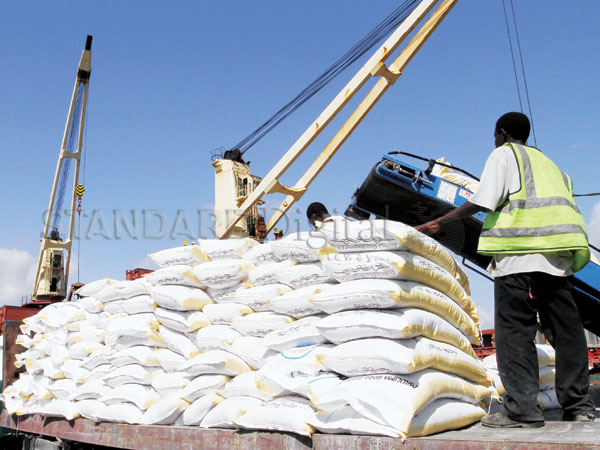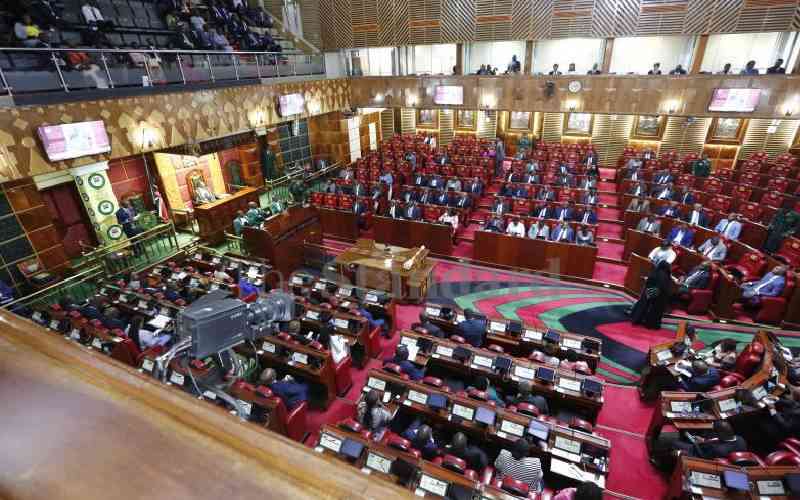 |
|
Fertiliser imports at Mombasa Port. The proposed 16 per cent levy on farm inputs is expected to lead to a rise in the price of produce. [PHOTO: FILE/STANDARD] |
By James Anyanzwa
KENYA: Prices of books, learning materials and newspapers are likely to go up considerably, following the passing of the controversial Value Added Tax Bill 2013 in Parliament on Tuesday.
Agricultural experts and consumer lobby groups have also warned of a looming food crisis, massive layoffs and a resurgence of cartels in the sector over the Government’s move to impose a 16 per cent tax on farm inputs.
Though legislators introduced amendments that saw foods and drugs exempted from the proposed levy, they did not extend the changes to learning materials and farm inputs.
“The introduction of VAT on farm inputs will definitely lead to increases in the cost of production for farmers, who are likely to load that extra cost onto consumers,” said Paul Mbuni, the national chairman of the Kenya Society for Agricultural Professionals (Kesap). “Food prices will definitely go up as a result of this taxation.”
Mbuni said the impact of the new levy would start being felt towards the end of this year and early next year.
According to the Consumer Federation of Kenya (Cofek), the levy will open a floodgate for cheaper and counterfeit farm inputs such as seeds, fertiliser and machinery, reduced investment in the agricultural sector and capital flight from the sector.
Cartels
The lobby group added there would likely be an emergence of hoarding cartels in the agriculture sector and a reduction of employment in agro-based industries.
“We expect to see our food security come down by not anything less than 20 per cent unless the Government intervenes by giving some form of subsidies to the farmers and injects fresh financing in the sector,” said Stephen Mutoro, Cofek’s secretary-general.
The Bill, which has attracted a lot of public protest, imposes a 16 per cent tax on the cost of freight, insurance and services relating to imported goods.
Kenya also imports its paper — after the collapse of the Webuye-based Pan Paper Mills — which is the biggest input for printed books and newsprint.
This is bound to increase the costs borne by producers of books and newsprint.
The Kenya Association of Publishers (KPA) estimates that 95 per cent of the materials (paper and ink) used in the production of books are imported.
“We import almost 100 per cent of the paper we use,” said Lawrence Njagi, the KPA chairman.
Stay informed. Subscribe to our newsletter
According to the association, the passage of the Bill lays ground for the cost of books and learning materials to increase by more than 50 per cent.
Njagi added that Kenyan books would also not be competitive at the regional level, a scenario that could push some local publishers out of business.
“The full tax burden will be transferred to the final consumer, pushing up inflation rates,” he said.
“There will also be serious challenges in attaining Vision 2030 since most graduates of our institutions of higher learning will come out half-baked, having gone through the education system without books — the primary resource for learning.”
According to KPA, the price, for instance, of a Standard Six Mathematics textbook retailing at Sh356 would rise to Sh557.
The prices of English and Kiswahili textbooks selling at Sh420 and Sh365 would rise to Sh655 and Sh570, respectively.
However, the National Treasury has argued that it is more prudent to protect the poor through subsidies on social programmes, such as free education, rather than through Government revenue.
 The Standard Group Plc is a
multi-media organization with investments in media platforms spanning newspaper
print operations, television, radio broadcasting, digital and online services. The
Standard Group is recognized as a leading multi-media house in Kenya with a key
influence in matters of national and international interest.
The Standard Group Plc is a
multi-media organization with investments in media platforms spanning newspaper
print operations, television, radio broadcasting, digital and online services. The
Standard Group is recognized as a leading multi-media house in Kenya with a key
influence in matters of national and international interest.
 The Standard Group Plc is a
multi-media organization with investments in media platforms spanning newspaper
print operations, television, radio broadcasting, digital and online services. The
Standard Group is recognized as a leading multi-media house in Kenya with a key
influence in matters of national and international interest.
The Standard Group Plc is a
multi-media organization with investments in media platforms spanning newspaper
print operations, television, radio broadcasting, digital and online services. The
Standard Group is recognized as a leading multi-media house in Kenya with a key
influence in matters of national and international interest.









